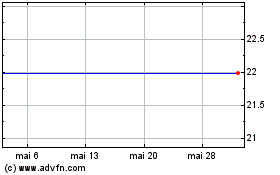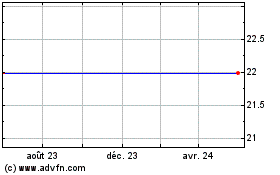2nd UPDATE: High Court Bars Labeling Lawsuits Vs Generic Drug Makers
23 Juin 2011 - 10:13PM
Dow Jones News
A divided Supreme Court on Thursday shielded generic drug makers
from consumer lawsuits alleging they inadequately labeled their
products.
The 5-4 ruling, written by Justice Clarence Thomas, followed a
different path than the court's 2009 ruling against Pfizer Inc.'s
(PFE) Wyeth unit. In that earlier ruling, the court said Food and
Drug Administration regulations didn't protect a drug company from
being sued under state law over drug labeling.
Generic drug makers, seeking to distinguish their case from the
court's earlier ruling, argued they shouldn't face the same types
of labeling lawsuits as branded drug makers because they had no
choice but to use the same drug labels that the brand manufacturer
used.
The court, in an ideologically divided ruling, agreed. "It was
impossible for the manufacturers to comply with both their
state-law duty to change the label and their federal law duty to
keep the label the same," Thomas wrote in a 20-page opinion. He
said the lawsuits against the generic companies are pre-empted by
federal drug regulations.
Thomas acknowledged that the divergent treatment of brand-name
and generic companies would make "little sense" from a consumer
perspective. "But it is not this court's task to decide whether the
statutory scheme established by Congress is unusual or even
bizarre," he said.
The court's four liberal members dissented, saying the ruling
"effectively rewrites" the court's decision in the Wyeth case.
"As a result of today's decision, whether a consumer harmed by
inadequate warnings can obtain relief turns solely on the
happenstances of whether her pharmacist filled her prescription
with a brand-name or generic drug," Justice Sonia Sotomayor wrote
for the dissenters.
In the case before the high court, generic-drug makers were
seeking protection from two product liability lawsuits by consumers
alleging they developed a neurological movement disorder after
taking generic versions of the heartburn drug Reglan, a name-brand
drug manufactured by Wyeth, and later by Schwarz Pharma Inc.
The two women at the center of the case began taking generic
versions of the drug in 2001 and 2002. The FDA later approved a
stronger warning label for Reglan in 2004, and ordered a black-box
warning for the drug in 2009, saying it could cause the movement
disorder.
The plaintiffs said the generic companies weren't powerless
bystanders and did have the ability to ask the FDA to approve
stronger warning labels for both the brand and generic versions of
the drug. They alleged that mounting evidence showed the drug
carried greater risks than previously known, but none of the drug
companies ever proposed revising the drug label to reflect that
risk.
Louis Bograd, the plaintiffs' lawyer at the high court, said the
ruling created an "absolutely untenable" situation in which the 75%
of the public that takes generics instead of brand drugs no longer
has a legal remedy in labeling cases. He urged the FDA and Congress
to consider regulatory or legislative changes.
The defendants included units of Teva Pharmaceutical Industries
Ltd. (TEVA, TEV.TV) and Mylan Inc. (MYL), as well as Actavis
Inc.
"This ruling furthers meaningful consumer protection while also
safeguarding against lawsuits that threaten the availability of
safe and affordable pharmaceutical products," Actavis Chief
Executive Doug Boothe said in a statement.
A Teva spokeswoman said the ruling provided "great clarity" to
the industry and patients, and would help alleviate unnecessary
litigation. Mylan didn't respond to a request for comment.
Federal appeals courts based in St. Louis and New Orleans had
allowed the lawsuits to proceed.
The lead case is Pliva v. Mensing, 09-993.
-By Brent Kendall, Dow Jones Newswires; 202-862-9222;
brent.kendall@dowjones.com
IMS Health (NYSE:RX)
Graphique Historique de l'Action
De Avr 2024 à Mai 2024

IMS Health (NYSE:RX)
Graphique Historique de l'Action
De Mai 2023 à Mai 2024
